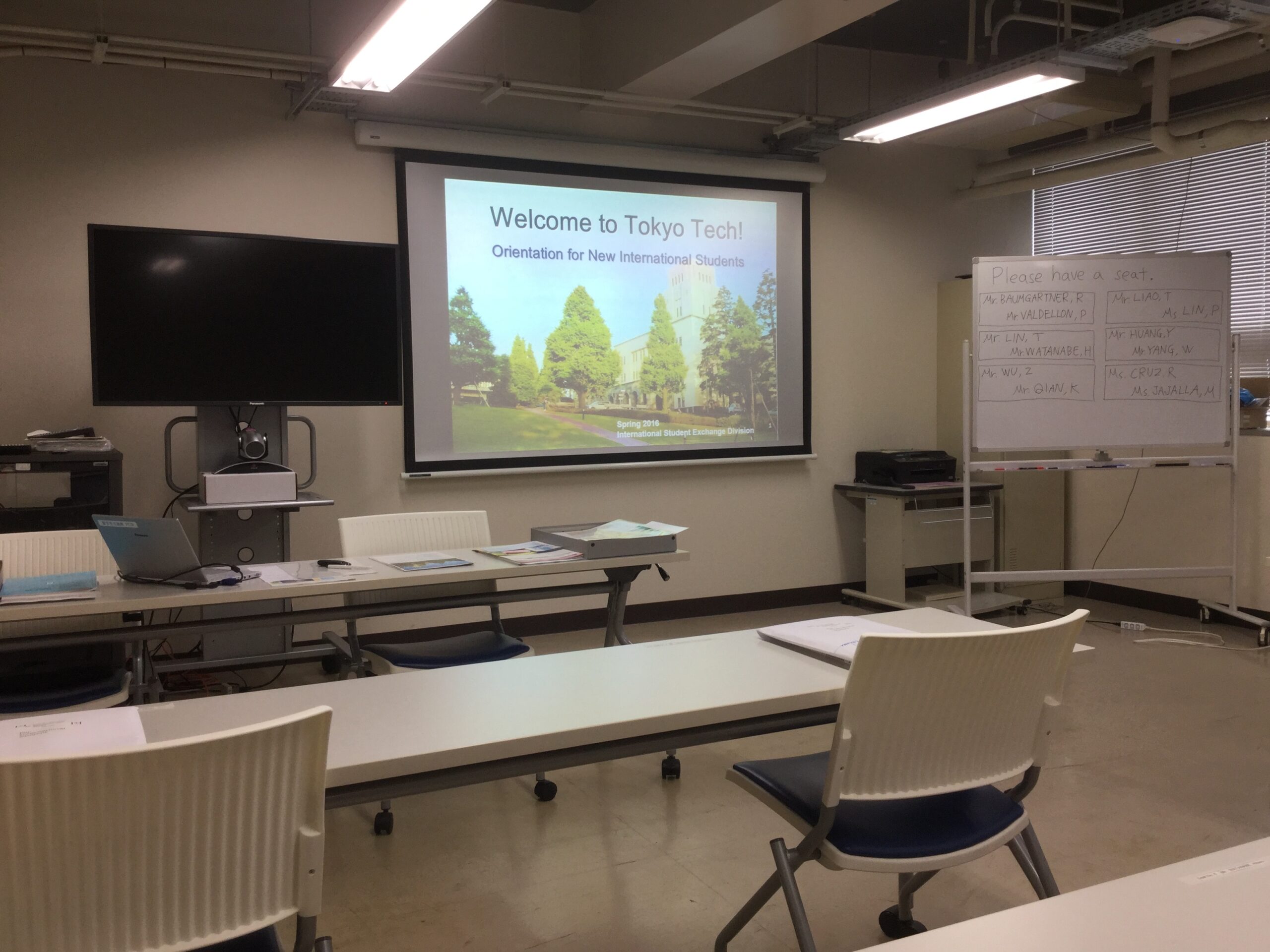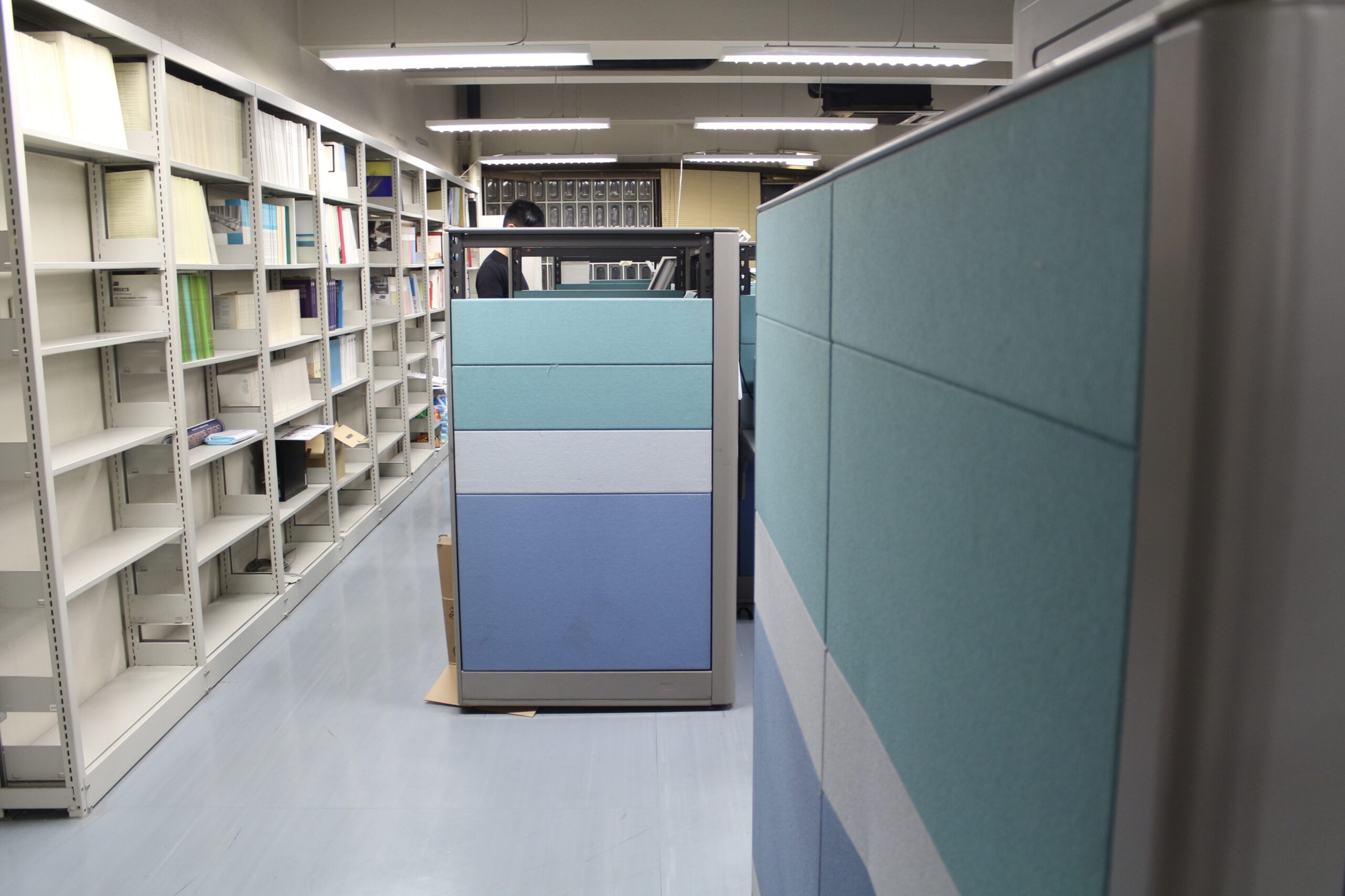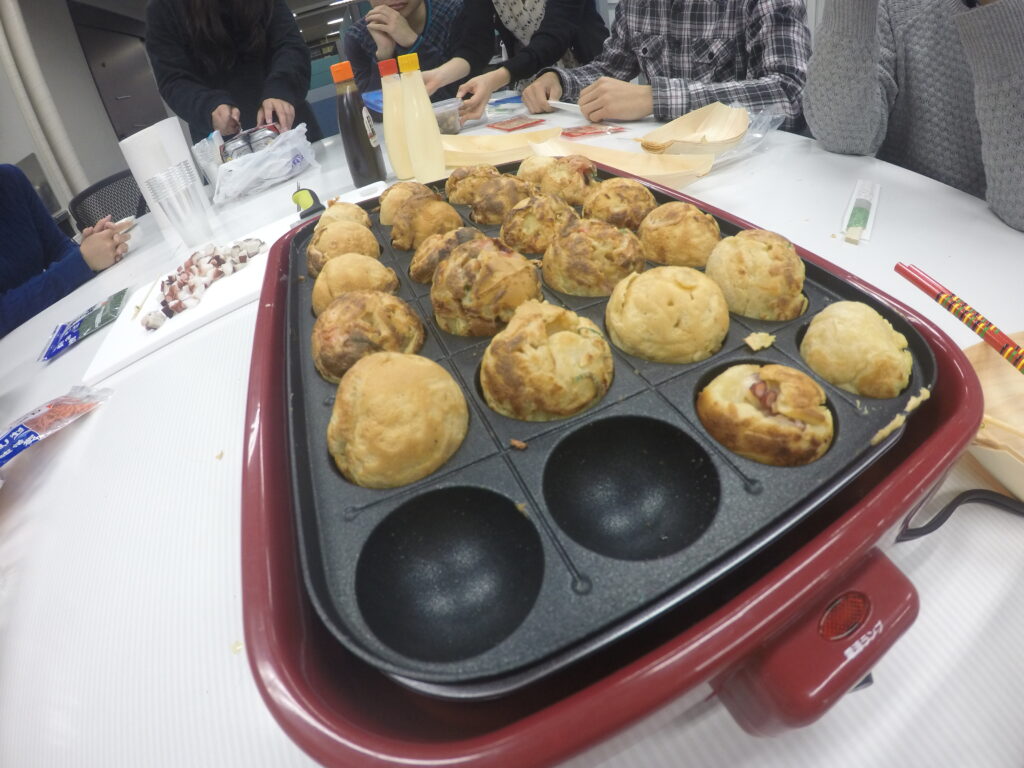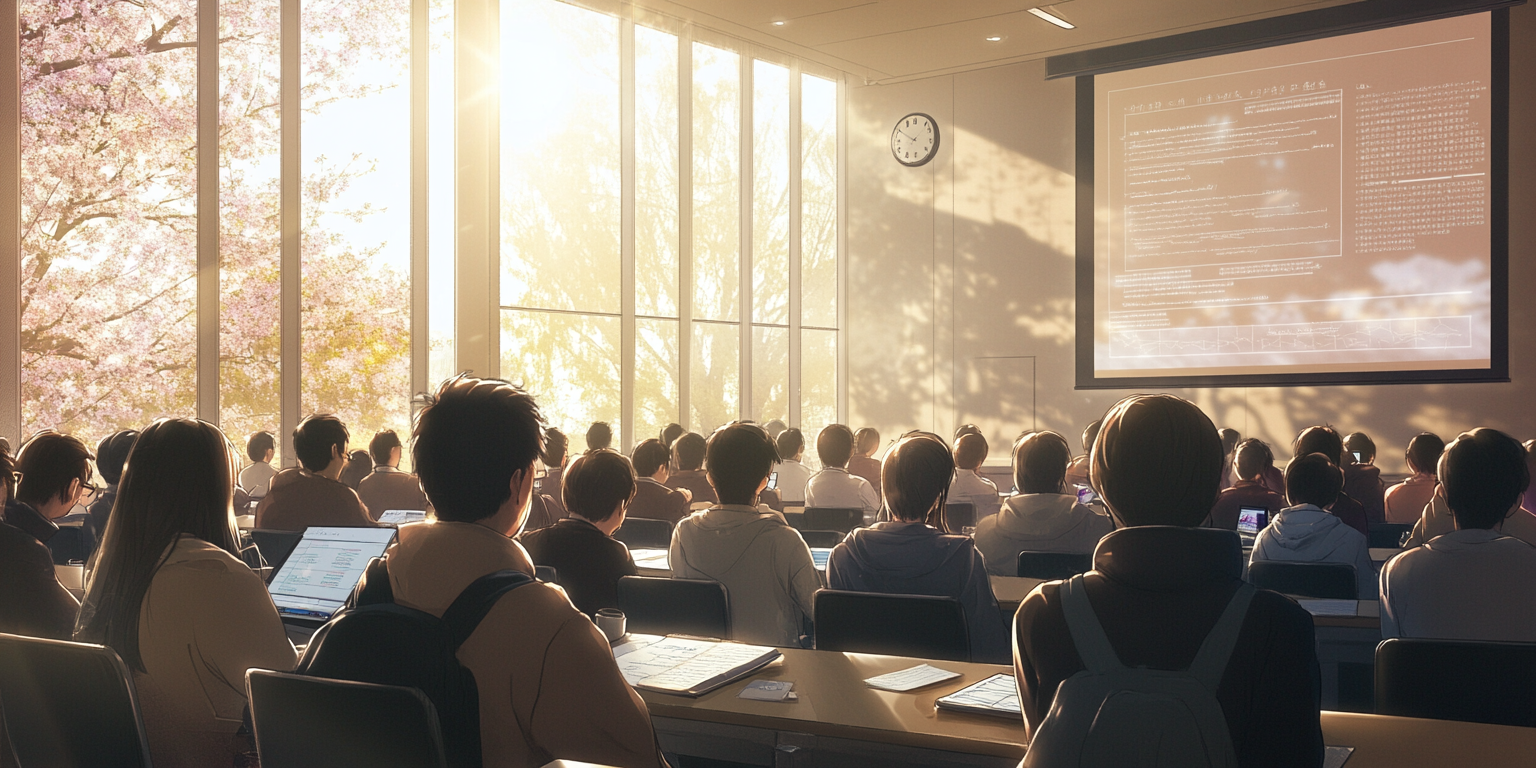
This is the first article in the series "Ch3: Life in the Laboratory".
Academic & Social
- ①Welcome to the New Student Training and Research Laboratory ← Current Location
- ②Classes, Zeroes, and Club Presentations
Leisure & Entertainment
social culture
Highlights of this article
- The complete procedure and notes for Orientation at Tokyo University of Science and Technology (Orientation)
- Japan-Taiwan Exchange Association Scholarship, Agency Procedures, and Application for Repatriation Travel Costs (with Tips for Avoiding Pitfalls)
- Sharing of real experiences of welcome party and celebration of birthday at the research laboratory
- Takoyaki Party: An in-depth experience of social culture at a Japanese research laboratory
- Nine members of the Research Laboratory gave a full presentation on interpersonal skills.
- Frequently Asked Questions (FAQ)
- Guided Reading and Reading Suggestions
- Orientation (Orientation) - The official start of your study abroad life.
- How to get a scholarship (super important.) Don't miss it!)
- Welcome party for the research center - the first step to integrate into the Japanese academic circle
- Introduction of Research Laboratory Members (My Sato Research Laboratory Family)
- Takoyaki Pattaya (Octopus Grill Party) - Japan Research Center Social Culture
- Conclusion
- Frequently Asked Questions (FAQ) for Readers
- Related Resources
- Read Next
Guided Reading and Reading Suggestions
This post chronicles my complete experience when I first arrived at Tohoku University in April 2016, from freshman orientation, to the research lab welcome party, to my first takoyaki party. If you are about to study in Japan or want to learn about the real culture of Japanese research laboratories, this article will help you:
✅ Find out what important documents you'll get at orientation(student ID, insurance, class selection information)
✅ Mastering the Scholarship Signature Process(Avoid missing out and not being able to collect)
✅ Learning how to integrate into the research laboratory(Self-introduction, preparation of souvenirs, participation in activities)
✅ Getting to know the social culture of Japanese research laboratories(Welcome party, birthday party, takoyaki party)
It is recommended to read the Quick Checklist first, then complete it step-by-step according to the schedule, and finally refer to the FAQ to solve the frequently asked questions.
Quick checklist (required on orientation day)
- 📋 Freshman pre-training preparation
- Bring your passport, resident card, and enrollment authorization documents.
- Prepare a notebook and pen (to record important information)
- Prepare Taiwanese souvenirs (pineapple cake, tea leaves, etc., to be delivered to support staff).
- Confirmation of training time and place (usually at Ookayama Campus)
- Allow half a day to one day (training may be longer)
- 📋 What to do on Newborn Training Day
- Pick up documents such as student ID cards, campus guides, insurance information, and class selection manuals.
- Understanding the Course Selection System and Credit Requirements
- If there is a scholarship, confirm the place and time of the signature on the "Certificate of Eligibility".
- Memorize the contact information of the International Student Support Office
- Attend a campus tour (familiarize yourself with the library, student cafeteria, convenience store, etc.)
- 📋 Prepare to check in at the lab
- Prepare for self-introduction (Japanese or English, about 1 minute)
- Preparation of Taiwanese souvenirs for members of the research laboratory
- Confirm the location of the supervising professor's office
- Find out the time of the Research Laboratory meeting (ゼミ).
- Active participation in welcome parties and social events
Orientation (Orientation) - The official start of your study abroad life.
📅 Time and place
Time: April 5, 2016 (usually one week before the start of the semester)
LocationHigashi Kogyo University Okayama Campus (Organized by the International Student Support Office)
object (of discussion): All exchange students and incoming students

📦 What do I get at orientation?
As soon as I entered the classroom, there was a thick stack of information waiting for me on my desk, covering:
| Document Type | Description | significance |
|---|---|---|
| Student ID | Can be used in libraries, cafeterias, gymnasiums, etc. | ⭐⭐⭐⭐⭐ |
| Campus Guide | Campus Map, Functional Description of Each Building | ⭐⭐⭐⭐ |
| Insurance Information | Description of National Health Insurance and Student Health Insurance | ⭐⭐⭐⭐⭐ |
| Course Selection Handbook | Course Selection System Operation, Credit Requirements, Course Schedule | ⭐⭐⭐⭐⭐ |
| Eastern Polytechnic University Registration Card | For borrowing books from the library, logging in to computers, etc. | ⭐⭐⭐⭐ |
| Bank Account Opening Guide | SMBC Bank Account Opening Process | ⭐⭐⭐⭐ |
| Scholarship Description(if applicable) | How to sign the registration book and when to issue it | ⭐⭐⭐⭐⭐ |
💡 little reminderThese documents are very important and should be organized in a folder for safekeeping. It is important to carry your student ID card with you (student discounts apply).
🎒 Prepare Taiwanese souvenirs as a token of our appreciation.
I prepared a box of pineapple cake for the staff at the Student Support Office to thank them for their hard work. They patiently answered my numerous questions in English (or simple Japanese) and helped me to complete the procedures smoothly. This small gesture not only expresses my gratitude, but also makes our interaction even warmer.
💡 Cultural Literacy: In Japan, giving gifts (omiyage) is an important way to express gratitude and build relationships. It doesn't need to be expensive, but the thought is most important. We recommend Taiwanese souvenirs:
- Pineapple Crisp (Microhills, Gatorade, etc.)
- Tea (Oriental Beauty Tea, High Mountain Tea)
- Masks (My Beauty Diary, etc.)
- Suncakes, Nougat
How to get a scholarship (super important.) Don't miss it!)
If you have applied for the "Japan-Taiwan Exchange Association Short-Term Scholarship" or other MEXT scholarships, it is important to note the following things because Once you miss the signature, you will not be able to receive the scholarship for that month.There are no remedies!
📝 Three Steps to Scholarships
Step 1: Locate the place where you want to place your "Book of Registry".
register of attendance(The "Student Registration Book for Foreign Students" is a signature book to prove that you are "in school" and you must sign it every month in order to receive the scholarship.
Placement::
- Ookayama Campus: Student Support Section, Taki Plaza, B1F, Taki Plaza
- Suzukaedai Campus: "Suzukaektai Student Support Group", 1F, Building J1
💡 little reminder: It is recommended to set a monthly reminder (e.g., 5th, 20th of the month) on your phone calendar so that you don't forget to sign.
Step 2: Understand Signature Deadlines and Release Times
per month Deadline for two signaturesThe scholarships are awarded at different times of the year:
| Signature Deadline | Scholarship Payment Schedule | Suggested Signature Time |
|---|---|---|
| First deadline | End of the month | 1-10 days per month |
| Second deadline | mid-next month | 11-20 days per month |
Example::
- If you sign before April 8 → Scholarship will be paid at the end of April.
- If you sign before April 18 → Scholarships are released in mid-May
- If you miss the two April deadlines → Scholarship for April is not available.(No reason at all)
⚠️ Pit Avoidance Warning: Unsigned months.Cannot receive a scholarship for any reason.There is no remedy for illness, going abroad, or forgetting! Even if you are sick, go abroad, or forget, there is no remedy. Be sure to set a reminder!
Step 3: Sign and date the form in person.
When you arrive at the place where the registration book is located, find your name, sign and date it with a ballpoint pen.
💡 little reminderPlease use the same English romanization as your passport when signing your name to avoid subsequent verification problems.
🔄 Proxy (if leave or internship is required)
If you are unable to come to campus on time to sign your name due to internships, seminars, returning to your home country, etc., you can apply for a Acting Charge(Appoint someone else to sign on your behalf). The application process is as follows:
- Consultation with the Student Support Section at least two months in advance("Don't put it off till the last minute.)
- Prepare and submit the following documents to the Ministry of Education, Culture, Sports, Science and Technology::
- Reason for Charge(state reason for not being able to sign in person)
- Research Programs(Describe the content of the internship or seminar)
- Proof of acceptance(e.g. acceptance letter from internship company, invitation to seminar)
- After obtaining approval, appoint a trusted person to sign on your behalf.(e.g., research lab students, student support center staff)
💡 Practical RecommendationsIf you are planning to go back to your home country for the summer vacation or to attend an overseas seminar, it is recommended that you consult with the Student Support Office at least two months before you leave your school. If you are planning to go back to your home country for the summer or attend a seminar overseas, it is recommended that you consult with the Student Support Office at least two months before you leave school.
✈️ Travel expenses application for repatriation
When you return to your home country at the end of your publicly-funded study period, you will receive Economy class ticket from Japan International Airport to the nearest international airport of your home country's residence(Paid for by the Government of Japan).
How to apply
Student support sessions will be held 1-2 months prior to the end of your period of study, to E-Mail Notification of how to apply and required documents. Usually required to be provided:
- Proof of date of return (air ticket reservation)
- Proof of address in home country
- Certificate of performance during the semester (issued by the supervising professor)
Unable to obtain repatriation travel expenses
In the following cases Unable to claim repatriation travel expensesPlease pay special attention to the following:
| Situation | Description |
|---|---|
| ❌ Short-term repatriation | For example, I will go back to Japan after my summer vacation in Taiwan. |
| ❌ Failure to depart by the required date | Leaving Japan after the expiration of the period of stay |
| ❌ Returning home due to personal reasons | Early termination of study at your own discretion |
| ❌ Work in Japan or continue to study in Japan | Staying in Japan after graduation to work or go on to higher education |
| ❌ Received travel funds from other organizations | If air tickets have been provided by the school or other scholarships |
| ❌ Breach of the Minister of Education, Culture, Sports, Science and Technology Oath | Such as academic misconduct, illegal behavior, etc. |
💡 little reminderIf you plan to continue your education or work in Japan, please inform the Student Support Section in advance to avoid affecting your eligibility for repatriation travel.
📄 Other Notes: Foreign Students' Ferry Term
Vacation or seminar, etc. Short-term departure from Japan If you are a member of the Board of Directors, you are required to submit the following form.International Students Ferry Term"(Expatriation Declaration Form).
Submission method
- Regular Student(for degree holders): you can apply through the application form on the EUT portal (T2APPs) Online Submission
- Non-regular students(Exchange students and graduate students): Fill out the paper "Ferry Term for International Students" and submit it to the Student Support Section.
Circumstances to be submitted
- Returning to visit relatives (e.g. summer vacation to Taiwan)
- Participation in Overseas Seminars
- Traveling to other countries
- Any outbound trip of more than 3 days
💡 little reminderEven if you are traveling for a short period of time, it is recommended that you submit your ferry pass to avoid any misunderstanding if you are not contacted by the school.
Welcome party for the research center - the first step to integrate into the Japanese academic circle
After completing orientation, you will then report to the research lab and attend the Welcome party(Welcome Ceremony.) Japanese schools and companies organize welcome ceremonies for newcomers, which are similar to those in Taiwan, but are more formal and focused on etiquette.
🎉 Purpose and Significance of the Welcome Reception
In Japan, welcome parties are more than just eating and drinking gatherings:
✅ Formal Introduction of New Members: Let's get to know your background and research topic.
✅ Building Relationships: To bring people closer to each other through self-introduction and communication.
✅ Understanding the culture of the research laboratories: Observe the atmosphere, interaction, and etiquette of the study room.
✅ Show your attitudeA proactive, humble and grateful attitude will make you more popular!
🏠 Sato Laboratory Welcome Party
I felt the warmth of a Japanese research laboratory for the first time during the welcome party for new students at the Sato Research Laboratory. It was held at an izakaya near the lab, and the atmosphere was relaxed but orderly. After everyone introduced themselves in order, Prof. Sato led us to raise a glass of "かんぱい" to officially start the party.
Although my Japanese was stuttering, the members of the laboratory applauded and welcomed me kindly. Especially Honda, a Chinese-Japanese student.He often helped me to translate from Chinese to Japanese so that I could mingle with the members of the laboratory more quickly.
💡 Self-Introduction Tips::
- Time Control: about 30 seconds to 1 minute (not too long)
- Contents includeName, place of origin, research topic, interest, and thanks
- Bow at the end: After saying "よろしくお願いいたします", bow 30-45 degrees.
- Prepare Chinese, English and Japanese versions: Depending on the atmosphere of the scene, the language to be used will be determined.
🍻 Welcome Meeting Flow (typical example)
Here's a brief timeline to give you an idea of how the welcome party will go:
| Time | Ring | Description |
|---|---|---|
| 18:30 | set (mathematics) | Meet at the entrance to the izakaya. Wait for everyone to arrive. |
| 18:45 | take one's seat | Newcomers usually sit in the "lower seats" near the door. |
| 19:00 | Opening Remarks | Welcome speech by professors or senior siblings |
| 19:05 | Self-introduction | Each member is introduced in turn (including newcomers) |
| 19:20 | lit. dry cup | The professor led a toast, "KANJI!" |
| 19:25-21:00 | mealtime exchange | Chat and get to know each other |
| 21:00 | End the toast. | Professors or principals lead "お疲れ様でした!" |
| 21:15 | Second meeting (optional) | Go to Karaoke or Renewal Booth |
💡 Engagement Tips::
- Active Pouring: Notice if other people's glasses are empty and offer to help pour (build goodwill)
- Moderate DrinkingDon't get drunk and lose your mind (it leaves a bad impression).
- Proactive communication: Don't just talk to people of the same nationality, get to know more Japanese students!
- Help me order.: If a shopkeeper comes to order, you can offer to take orders or communicate your needs.


Introduction of Research Laboratory Members (My Sato Research Laboratory Family)
The Laboratory's birthday celebration was initiated by Ms. Nakata, a first-year student in the Master's program, and has become an important event for the Laboratory to express gratitude and solidarity. I emphasize the birthdays of each member of the team, and through these celebrations, we get to know each other's personalities and stories. The following is a list of the 10 members of the lab in order of their birthdays.
- 👨🎓 Mr. Morita(Master 1, birthday in May)
- first impressionHe was serious, didn't talk much, and often corrected me on my use of Japanese and honorifics, which at first made me feel like he didn't like me very much.
- And then I found out.He was actually doing me a favor! He taught me the correct way to express myself in Japanese, research methods, and Japanese workplace etiquette. Later on, we often worked late into the night in the research lab together, played basketball, drank and chatted together, and he took care of me like a brother.
- Unforgettable MomentsOne time when I encountered a bottleneck in my research, he stayed up with me until 3 a.m. to discuss the solution.
- 👩🎓 Kida(MASTER 2, birthday in May)
- CharacteristicsShe was the best to me and took care of everything in the lab like a mother.
- Unforgettable MomentsOne time when I was presenting at a seminar, I was severely criticized by Mr. Miyamoto (a professor in his department) for my poor PPT presentation, and I was very frustrated at that moment. I was very frustrated, but Ms. Kida came to me after the meeting to comfort me and encourage me, and even took me out for dessert to relax. She often said to me, "Zero-kun, you're so cute! (Zero-kun, you're so cute!) She always said to me, "Zero-kun, kawaii ni!", which made me feel warm.
- Help me.::
- Remind me of the RL meeting time
- Help me print the class handouts.
- Teach me about the characteristics and culture of Japanese girls
- Care about my life and mood
- 👨🏫 Prof. Sato(Associate Professor, birthday in May)
- Characteristics: Young (about 35 at the time), fluent in English, and a friend to the students.
- Teaching StyleHe was a good teacher at every seminar and never put on airs. Even when I was behind in my research, he would patiently guide me instead of scolding me.
- Unforgettable MomentsOne time when I was eating alone in the student cafeteria, Prof. Sato saw me and took the initiative to sit down with me. He asked me, "Are you used to Japan? He asked me, "Are you used to Japan? Is the atmosphere in the research lab okay? He asked me, "Are you used to Japan? Is the atmosphere in the lab okay?" He made me feel valued and cared for.
- Impact on meHe made me realize that a good mentor professor is not just about teaching skills, but also about the whole person of the student.
- 👨🎓 Mr. Honda. (MASTER 2, JULY BIRTHDAY)
- contexts: Mixed Chinese and Japanese, mother is Chinese, father is Japanese, fluent in Chinese, English and Japanese.
- How it helped me::
- Assisted me with my senior thesis (translation, proofreading)
- We often take the train home with me (about 40 minutes ride) and share the Japanese people's attention to detail.
- Taught me how to use honorifics, how to communicate with professors, and how to write formal emails.
- Unforgettable MomentsOne time when I had to write a letter to my collaborating professor and I didn't know how to express myself in Japanese, Mr. Honda spent an hour correcting my letter sentence by sentence and explaining the tone and level of politeness of each sentence.
- current situationWe still keep in touch with each other and occasionally share our latest news via LINE.
- 👨🎓 Mr. Fujita(Master's 2nd year off, birthday in July)
- This senior seldom appeared in group activities, so I did not have much contact with him.
- 👨🎓 Mr. David(Boichi, August birthday)
- contextsI was a Filipino, the only foreign student in the lab besides me.
- Common GroundHe came here a year earlier than me and gave me a lot of practical advice.
- Unforgettable Moments: He taught me how to pick ingredients in Japanese supermarkets, how to eat well for the least amount of money, and which izakaya are cheap and delicious.
- 👩🎓 Nakata(Master I, birthday in October)
- Characteristics: Super funny, the "Pistachio" of the research lab, responsible for organizing parties and events.
- ContributionShe initiated the Laboratory Celebration, takoyaki party, BBQ party, etc., which filled the Laboratory with a joyful atmosphere.
- Unforgettable Moments: One time she imitated Prof. Sato's mantra and the whole research lab burst out laughing (including Prof. Sato himself).
- 👩🎓 Ms. Wada(Master I, birthday in October)
- CharacteristicsShe is super gentle and takes care of me like a big sister.
- Help me.::
- Remind me often of things I should do (e.g., pay reports, attend meetings)
- Help me print class handouts (since I don't know how to use a photocopier)
- Teach me about the characteristics of Japanese girls and dating culture.
- Encouragement when I'm nervous
- 👨🎓 Mr. Yamada(MASTER 2, NOVEMBER BIRTHDAY)
- CharacteristicsHe loves basketball, has a good sense of humor, understands girls, and likes the idol group "Nogizaka 46".
- common interestWe played basketball, discussed NBA games, and went to the gym.
- Unforgettable MomentsHe gave me a CD of Nogizaka 46 for Christmas and said, "You must learn about idol culture when you come to Japan!
- Getting Along: He used to smoke cigarettes with Morita-senpai (I don't smoke, but I would chat with them) and took care of me like an older brother.
- 👨🎓 Mr. Murata(MASTER 2, DECEMBER BIRTHDAYS)
- contextsA native of Kyoto, she speaks with a Kansai accent and has a gentle personality.
- CharacteristicsHe taught me all kinds of Japanese knowledge (history, culture, etiquette, dialect) like a father.
- common interestWe used to play pool together (there was a pool table in the research lab), and he was very good at it, and he used to give me a few points.
- Unforgettable MomentsHe taught me how to make Japanese tea, how to appreciate Japanese gardens, and how to taste sake.
💡 Interpersonal Experience: Some seniors may seem strict or cold at first, but most of the time they are just trying to help you improve. Keep an open mind and you will find that they are actually very warm.
Takoyaki Pattaya (Octopus Grill Party) - Japan Research Center Social Culture
Shortly after the welcome party, in order to promote the bonding of the members of the laboratory, the seniors organized a workshop in the laboratory to promote the bonding of the members of the laboratory. Takoyaki Patties(Takoyaki Party, for short) TacopaThis not only helped me to understand Japanese people's usual social activities, but also helped me to integrate into the life of the Japanese laboratory.) This not only helped me to understand how Japanese people socialize in their day-to-day life, but also helped me to better integrate into Japanese research laboratory life.

🐙 What is takoyaki pate?
A takoyaki parlor is a social gathering, usually attended by friends or family members, where takoyaki is made and enjoyed together. This kind of party is characterized by a relaxed and fun atmosphere, where participants are free to choose and add various toppings according to their own preferences, allowing everyone to enjoy their favorite flavors. Below are the features of this event:
✅ DIY Fun: Everyone can be involved in the production process.
✅ Creative IngredientsIn addition to octopus, you can add shrimp, cheese, vegetables, chocolate, and more!
✅ Relaxed atmosphere: It's more casual than formal gatherings, and it's easy to start a conversation.
✅ simple structure: Cheap ingredients, suitable for student gatherings
🍳 Divide up the work to increase bonding
In a takoyaki pajita, participants usually work together:
- Food Ingredients Procurement Team: Nakata and Wada are in charge.
- cookery team: Mr. Morita and Mr. Yamada are in charge of turning the takoyaki.
- Ingredients Preparation GroupDavid and I cut up the octopus and vegetables.
- Cleaning TeamKida-san is in charge. She always takes the initiative to clean up.
In addition to the traditional takoyaki, we tried a variety of creative toppings:
- 🦐 Grilled Octopus with Shrimp and Cheese(Mr. Honda's idea)
- 🍫 Chocolate Banana Takoyaki(Nakata-san's hilarious attempt, which turned out to be super yucky)
- 🌶️ Grilled Octopus with Kimchi and Cheese(David's Filipino Flavor)
💡 Engagement Tips::
- It doesn't matter if you don't know how to make takoyaki, you can just offer to help with chopping, plating or washing dishes.
- Demonstrate enthusiasm for participation (e.g., "I'll try it! I'll try it!" "It's delicious!) If you do, you'll be able to close the gap quickly.
- Don't just eat it yourself, but ask others, "Do you want to try this flavor?"
🎉 It's not just about the food at these gatherings.
Taka-yaki Pattaya is a great opportunity for bonding and fun sharing. Participants can interact with each other in a relaxed atmosphere, enjoying the cooking process and tasting their own handmade food.
This party was the first time I felt the "home" feeling of the Japan Research Center. We laughed, played, and enjoyed simple pleasures together regardless of grades and nationalities.
Conclusion
In this warm and cozy Sato Laboratory, I began a full and happy exchange life. From the beginning, when I was unfamiliar and uneasy, to the end, when I became a part of this big family, every step was full of challenges and emotions.
If you are going to study in Japan, I hope this article will help you understand more about the culture and life in a Japanese research laboratory. Remember:Keep an open mind, participate in activities, and treat people with sincerity.You will be able to build your own memories.
In the next post, I will share my academic life at TUST: from Japanese and English classes to major programs, from seminars (ゼミ) to conference presentations, and from zero foundation to Japanese thesis. Please look forward to it!
Frequently Asked Questions (FAQ) for Readers
- QDo I have to attend orientation?
- A
Attendance is highly recommended! Orientation provides important campus information, course selection instructions, and life support. Missing orientation may affect your ability to follow through with the rest of the program (e.g., course selection, insurance, scholarships). If you are unable to attend, please contact the International Student Support Office in advance to see if there is a way to make it work.
- QI don't have a scholarship, do I still need to sign a registration book?
- A
Yes, but only accept US Dollars or Euros, not Taiwan Dollars/Japanese Yen. There is a risk of having your account frozen, so it is recommended that you use SMBC without it. The signature on the registration book is only applicable to students who have a scholarship from the Ministry of Education, Culture, Sports, Science and Technology (e.g., MEXT or Japan-Taiwan Exchange Association Scholarship). If you are a self-funded student or have other scholarships, you do not need to sign the registration book.
- QWhat should I do if I forget to sign the registration book?
- A
Scholarships for that month will Unavailableand Unable to retroactively signThis is the strictest rule. This is the strictest rule and there is no flexibility. Suggestion:
- Stick a note on the wall of your dormitory to remind yourself.
- Set a monthly reminder (e.g., 5th, 20th of the month) in the phone's calendar
- Remind each other and your friends who also have scholarships.
- QWhat do I need to prepare for the Lab Welcome Party?
- A
Recommended preparation:
- Open Mentality(Initiate communication, smile, show sincerity)
- Short Self-Introduction(Japanese or English, about 1 minute)
- Taiwan Souvenirs(e.g., pineapple pie) to a member of the Research Laboratory.
- Appropriate Clothing(Business casual, don't wear slippers or be too casual)
- QWhat should I do if I'm not treated well by my fellow researchers at first?
- A
Don't worry, Japanese people are usually more introverted and need time to familiarize themselves. Suggestion:
- Active Participation(welcome party, overtime, dinner, etc.)
- Take the initiative to ask questions(e.g., "How do you say this in Japanese?" "How should I do this research?")
- Sharing Taiwan's Culture(Bringing Taiwanese snacks and introducing Taiwanese festivals)
- Keep smiling and polite(Say "おはようございます" in the morning and "お先に失礼します" in the evening.)
Usually after 1-2 months, the relationship will gradually warm up.
- QDo I have to pay for the welcome party?
- A
Depending on the circumstances:
- Organizer of the Research Laboratory: Usually the professor pays most of the cost, and the student may only have to share a small portion (about 1,000-2,000 yen).
- Student-run organizations: Usual average cost-sharing (about 3,000-5,000 yen)
- Newcomer OfferSome laboratories allow newcomers to pay less or nothing.
Recommendation: Prepare 5,000 yen in cash for contingency.
- QI can't drink. Will I be ostracized?
- A
No! Japanese people understand that some people cannot drink due to health, religious or personal factors. As long as:
- Honestly(e.g. "すみません, お酒が飲めません")
- Order non-alcoholic beverages(e.g., oolong tea, cola)
- Engage in other ways(e.g., helping with drinks, barbecue, livening up the atmosphere)
There will be no problem. The point is to show sincerity in participating, not how much you drink.
Related Resources
Read Next
Let's go, let's read the next one!
Want a little refresher on the last one?
Or go back to the EP1 catalog for a different story?




Message Center Feedback